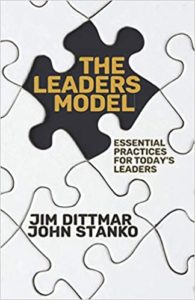I’m delighted to host this guest post from Jim Dittmar, co-author of A Leadership Carol: A Classic Tale for Modern Leaders as well as The LEADERS Model: Essential Practices for Today’s Leaders. His latest book is an operating manual for leadership today, offering a much-needed resource for those new to the role as well as seasoned professionals. The LEADERS Model: Essential Practices for Today’s Leaders is available for order through all fine book-sellers.
 Much has been written about using a “rational” approach to improve the quality of our decisions. We identify the issue, gather relevant facts, consider the alternatives, select the best one based on the data, then implement and evaluate our decisions. Using this process, we can avoid or at least minimize the effects of subjective or irrational influences that can derail our decision-making process.
Much has been written about using a “rational” approach to improve the quality of our decisions. We identify the issue, gather relevant facts, consider the alternatives, select the best one based on the data, then implement and evaluate our decisions. Using this process, we can avoid or at least minimize the effects of subjective or irrational influences that can derail our decision-making process.
But is there more to decision-making? Yes, and the focus of this blog is on INTUITION and whether there is any place for our subjective selves when we make decisions. What role, if any, should intuition play in our decision-making process? Are there decision-making circumstances in which intuition be used? Can our intuition be developed? And, what is intuition?
We think of intuition as “that gut feeling” about something when facing various situations. Beyond this basic idea, here is one definition among the many that have been offered:
“The idea that individuals can make successful decisions without deliberate analytical thought” (Association for Psychological Science, 2018).
So, given these explanations, is using intuition when making decisions a good thing to do? How about a qualified “yes?” Yes, depending on the situation. That includes the person(s) making the decision and the conditions in which that decision is being made. In those conditions that are more predictive in nature and in which we have a great deal of previous experience, using intuition can help us make quick and accurate choices, particularly when time is of the essence.
Firefighters do this. When confronting a fire, they immediately assess the situation and make quick, intuitive decisions that help them effectively fight the fire and protect the lives of firefighters and people who may be threatened by the fire. They do this without conscious, rational deliberation. They simply react—using their intuition.
How can they do this? They learn how fires behave. This knowledge can be used to quickly recognize what is happening. In other words, they have “seen this before,” can predict what will happen, and respond accordingly. That’s how our mind is wired—to record these experiences as patterns in our memories.
Using intuition rather than rational deliberation, though, in circumstances that are complex, uncertain, or unknown, is not always a good thing. Those experiential patterns may not apply, but we may think they do, resulting in disastrous choices. In addition, when experts in specific areas try to use intuition in situations with which they are not familiar, big mistakes can occur. There are many examples of CEOs who had a “hunch” their companies should engage in something new that led to catastrophic results.
Finally, can you develop and improve the usefulness of your intuition? Many believe so. You can use emotional intelligence, apply mindfulness techniques, become more competent in your profession, experience, experience, experience…and learn from those experiences as ways to strengthen your intuitive capacity.
Use your intuition wisely—know when to use it, when to use a rational approach, and when to use a combination of both.
 For more than 30 years, Jim Dittmar has served in the field of leadership development as a practitioner, teacher, consultant, researcher, and author. He is the founder, president, and CEO of 3Rivers Leadership Institute. Prior to this, Jim was the founder and director of the Geneva College M.S. in Organizational Leadership Program. He is the co-author of the recently released book, The LEADERS Model: Essential Practices for Today’s Leaders.
For more than 30 years, Jim Dittmar has served in the field of leadership development as a practitioner, teacher, consultant, researcher, and author. He is the founder, president, and CEO of 3Rivers Leadership Institute. Prior to this, Jim was the founder and director of the Geneva College M.S. in Organizational Leadership Program. He is the co-author of the recently released book, The LEADERS Model: Essential Practices for Today’s Leaders.

